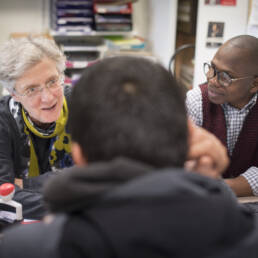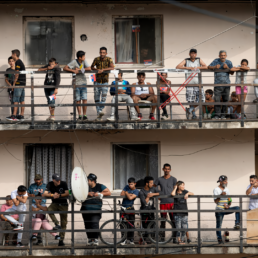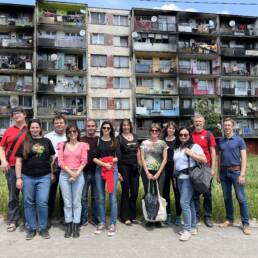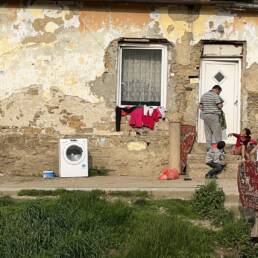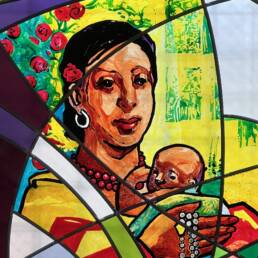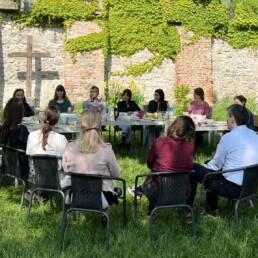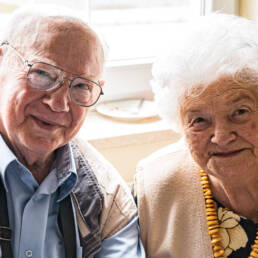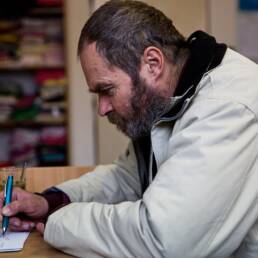Author
Marco Aliotta
Head of Project Unit
Fondazione diocesana Caritas Trieste
On Monday 21 June, as part of the events promoted by Portugal for the rotating Presidency of the Council of the European Union, the conference ‘Combating Homelessness – A priority of our Social Europe‘ was held in Lisbon, during which the governments of all European countries committed themselves to eliminating homelessness by 2030.
During the conference, the ceremony of the 3rd edition of the Ending Homelessness Awards was held, an award set up by Feantsa (European Federation of National Organisations Working with the Homeless), which aims to reward good practices in the use of European funds to combat the extreme poverty of homeless people. The jury, made up of representatives of European institutions, awarded the Housing First Trieste project the ‘bronze medal’ for having combined the European Social Fund and FAED to promote inclusion paths for thirty residents with housing problems. The project, experimentally activated by Fondazione diocesana Caritas Trieste in 2016, was initially financed with funds deriving from Caritas Italiana. It was implemented in collaboration with the Municipality of Trieste, which provided the flats through funding from the European Social Fund, the partnership of the social cooperative Lybra for inclusion paths and the involvement of the Emporio della Solidarietà for food support. The collaboration with fio.PSD – Federazione Italiana Organismi per le Persone Senza Dimora (Italian Federation of Organisations for Homeless People) – which has been supporting Caritas since 2014 through the Housing First Italia Network, is fundamental, both for the training of the team and for the evaluation tools made available for analysing the progress of the projects.

The experimentation by Fondazione Caritas Trieste of a Housing First project stems from the observation of the persistence of precarious housing situations in which many families are involved. Social Services, Caritas and private social services, normally offered support through accommodation in collective facilities. These interventions, if they succeed in filling basic needs, make people more exposed to the effects of new difficulties, such as reduced decision-making capacity. Thus, the conditions of distress are consolidated and aggravated, exacerbating a self-feeding chronic process. The main objective of the intervention is therefore to act on the discomfort and to make people real protagonists of their life path.
All the beneficiaries have been identified among those for whom other housing projects failed and who are homeless or live in unsafe or inadequate housing.
In general, the project gave every single person or family the time to make the necessary choices to decide which path to take. The choice of the apartment and its layout also increases involvement, and the work with the neighbourhood has fostered the sense of belonging.
These are two stories of people involved in the project.
A young woman (25 years old) with a son (4 years old) who, since she became a mother, because of dependency problems inside the family of origin, went to live with her disabled grandmother in a condition of overcrowding and with serious conflict with her ex-partner . During the project, she was helped to set up a training course and to apply for a council house that later was assigned to her. The team supervised the exit from the HF accommodation and supported the entry into the new one.
A man (55 years old) who broke off his relationship with his wife and ended up on the street due to problems with alcohol. During the project a joint decision was made to begin an alcohol addiction support service that he attended regularly. A lot of work has been done in building relations with the neighbourhood and the person has made himself available to help the older people in the building where he lives. The team helped him to reconnect with his wife who in the end accepted him back into the home.
For the Housing First projects to get started in the region, the advocacy action of Caritas was fundamental. The objective was to make the experimentation of the Housing First methodology a shared policy and practice at institutional level, for the concrete realisation of the fundamental rights of homeless people and their integral human development.
The role of Caritas, fostered by stable relations with institutional actors, was to facilitate relations between the regional and local levels, providing support with respect to knowledge of the phenomenon, the definition of the objective to be achieved and technical and operational aspects necessary for the co-designing of interventions.
Currently, work is under way to make the project a stable and a complementary measure with the more classic “step-by-step” approach, from shelter through successive steps to autonomy, aware that restoring dignity to homeless people is a complex challenge that requires multi-level action, study, observation, expertise and innovation.
Read more about Housing First on the Caritas Trieste website (in Italian).


